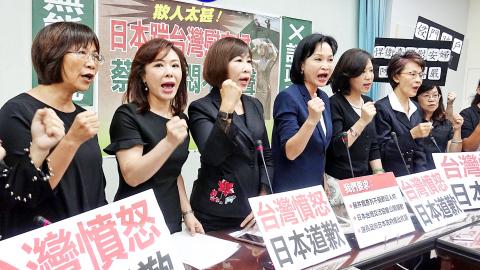The Chinese Nationalist Party (KMT) caucus yesterday accused the government of inaction following the alleged attack by a Japanese visitor on a comfort woman statue erected next to the party’s Tainan chapter offices.
Japanese Representative to Taiwan Mikio Numata must apologize for the incident, but the government has shied away from responding to the “intrusive and impudent” action of Mitsuhiko Fujii, a member of the Alliance for Truth About Comfort Women, KMT caucus deputy secretary-general Ko Chih-en (柯志恩) told a news conference in Taipei.
Fujii can allegedly be seen in surveillance footage kicking the statue on Thursday last week during a visit to Taiwan to deliver an invitation to the Tainan Alliance for Comfort Women’s Rights to a public debate on the comfort women issue.

Photo: Liu Hsin-de, Taipei Times
Fujii lied when he accused the KMT of altering the footage and said he had only stretched his leg because he felt a “numbness” in it, Ko said.
The Ministry of the Interior must list Fujii as an unwelcome person and Representative to Japan Frank Hsieh (謝長廷) must lodge a formal protest with Tokyo over the incident, the caucus said.
Calling Fujii’s claims “pathetic and shameless,” KMT Legislator Alicia Wang (王育敏) said Fujii’s action had hurt the dignity of Taiwanese women and was intolerable.
As the nation’s first female leader, President Tsai Ing-wen’s (蔡英文) silence over the incident was disheartening, Wang said.
Wang said she has completed a draft amendment to protect the rights of former comfort women and their families, which the incident showed are in need of strengthening.
Her proposal stipulates a prison term of up to one year and a fine of up to NT$10,000 for people who hurt the dignity of former comfort women through discriminatory actions, which would include disrespecting statues, she said.
The UN Human Rights Committee in 1996 defined comfort women as girls and women from several Asian nations who were abducted and forced into sexual slavery prior to and during World War II by the Japanese Imperial Army, Hua Hsia Social Welfare Association director-general Jennifer Wang (王如玄) told the news conference.
Japan and South Korea signed an agreement on Dec. 28, 2015, to resolve the comfort women issue, with Japanese Prime Minister Shinzo Abe issuing an apology and Tokyo issuing compensation, but Taiwanese comfort women have not yet received the apology and compensation they are due, Wang said.
“I have often wondered: Are Taiwanese not as human as South Koreans?” she said.

The Ministry of Economic Affairs has fined Taobao NT$1.2 million (US$36,912) for advertisements that exceed its approved business scope, requiring the Chinese e-commerce platform to make corrections in the first half of this year or its license may be revoked. Lawmakers have called for stricter enforcement of Chinese e-commerce platforms and measures to prevent China from laundering its goods through Taiwan in response to US President Donald Trump’s heavy tariffs on China. The Legislative Yuan’s Finance Committee met today to discuss policies to prevent China from dumping goods in Taiwan, inviting government agencies to report. Democratic Progressive Party Legislator Kuo Kuo-wen (郭國文) said

The Ministry of Economic Affairs has fined Taobao NT$1.2 million (US$36,900) for advertisements that exceeded its approved business scope and ordered the Chinese e-commerce platform to make corrections in the first half of this year or its license would be revoked. Lawmakers have called for stricter supervision of Chinese e-commerce platforms and more stringent measures to prevent China from laundering its goods through Taiwan as US President Donald Trump’s administration cracks down on origin laundering. The legislature’s Finance Committee yesterday met to discuss policies to prevent China from dumping goods in Taiwan, inviting government agencies to report on the matter. Democratic Progressive Party

Taiwan and its Pacific ally Tuvalu on Tuesday signed two accords aimed at facilitating bilateral cooperation on labor affairs, according to Taiwan’s Ministry of Foreign Affairs (MOFA). The governments inked two agreements in Taipei, witnessed by Foreign Minister Lin Chia-lung (林佳龍) and visiting Deputy Tuvaluan Prime Minister Panapasi Nelesone, MOFA said in a news release. According to MOFA, the agreements will facilitate cooperation on labor issues and allow the two sides to mutually recognize seafarers’ certificates and related training. Taiwan would also continue to collaborate with Tuvalu across various fields to promote economic prosperity as well as the well-being of their

Sung Chien-liang (宋建樑), who led efforts to recall Democratic Progressive Party (DPP) Legislator Lee Kun-cheng (李坤城), was released on bail of NT$80,000 today amid outcry over his decision to wear a Nazi armband to questioning the night before. Sung arrived at the New Taipei District Prosecutors’ Office for questioning in a recall petition forgery case last night wearing a red armband bearing a swastika, carrying a copy of Adolf Hitler’s Mein Kampf and giving a Nazi salute. Sung left the building at 1:15am without the armband and covering the book with his coat. Lee said today that this is a serious